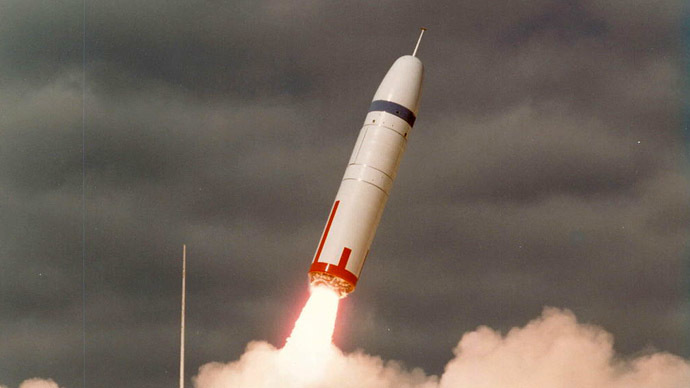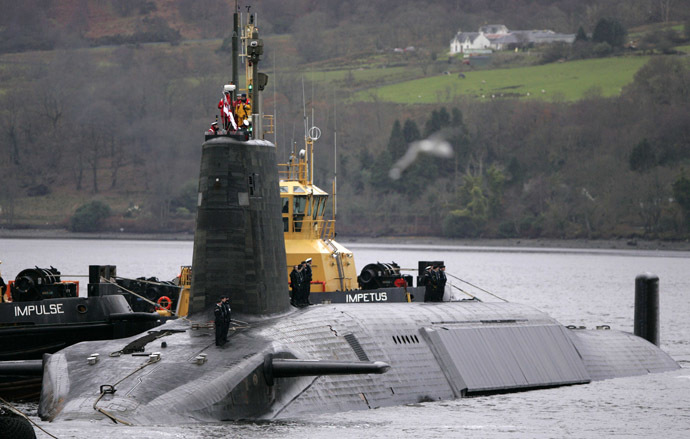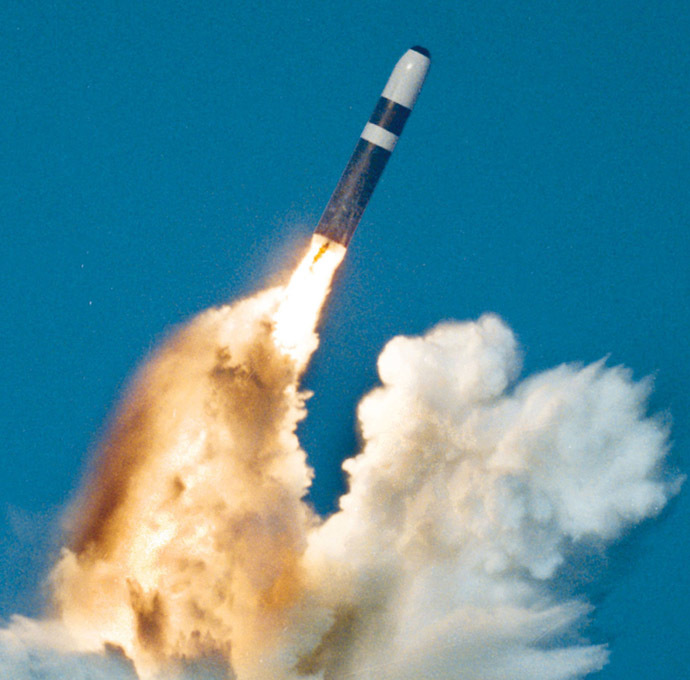UK seeks to renew pact with US on nuke data exchange, warhead design

London and Washington are eyeing renewal of a 1958 pact which would allow the two countries to share sensitive nuclear-related data, including warhead design and the exchange of material crucial in nuke production and stockpiling, British media report.
The 1958 pact is the Mutual Defense Agreement (MDA) – a document praising close interaction while designing new nuclear warheads, as well as manufacturing materials. While seeking to prolong it, as it was done back in 2004, Whitehall however does not seem to be planning to take it to the British parliament.
“A debate on the renewal of the MDA would be used by some as an opportunity to raise wider questions concerning the possible renewal of the nuclear deterrent, the future of the [UK’s] Atomic Weapons Establishment and our obligations under the nuclear non-proliferation treaty,” argues internal paper of British Ministry of Defence (MoD). The paper was obtained by the Guardian through a Freedom of Information request.
A debate on the issue could only take place if Commons committees demand greater parliamentary and public insight into issues involved, whereas debate requests from individual MPs have been refused.
In the US the MDA agreement is incorporated into the law, but in Britain it has no legal status.
The pact between the two countries regarding joint development of new nuclear warheads is expected to be signed in a “discreet ceremony” in Washington within the next weeks, reports the Guardian.

Meanwhile, American officials will be visiting the AWE, which is responsible for the design, manufacture and support of warheads for the UK's nuclear deterrent, to discuss the agreement details. The documents prepared for this visit cite “enhanced collaboration” regarding “nuclear explosive package design and certification” with “possible development of safer, more secure, warheads,” as well as “maintenance of existing stockpiles” of nuclear weapons.
The slightly censored paper also refers to a 2006 letter written by then-British PM Tony Blair to American President George Bush, containing a plea to help Britain maintaining its “nuclear delivery system,” which helped to start replacing British fleet nuclear missile submarines.
MDA vs Proliferation of Nuclear Weapons
For decades the two major NATO allies have been acting as if they never signed the Treaty on the Non-Proliferation of Nuclear Weapons (NPT) that entered into force in 1970.
The Article One of the NPT prohibits all signatory countries to pass a nuclear weapon, as well as direct or indirect control over it, “to any recipient whatsoever.”
The MoD maintains that the MDA pact does not contradict the Non-Proliferation Treaty because physical “movements under the MDA do not involve nuclear weapons or devices,” an MoD briefing paper drawn up for ministers said.
“None of it is permissible in my view. For 40 years the US and Britain have completely ignored that because it doesn’t suit them,” David Lowry, former director of the European Proliferation Information Centre, however told WhoWhatWhy news website.

“If Iran and North Korea had signed a similar agreement for the transfer of nuclear weapons technology, the UK and US would be branding them pariah nations and screaming for the toughest of international sanctions to be imposed,” Peter Burt of Nuclear Information Service, the man who shared the papers with the Guardian, said.
Keeping alive the MDA agreement signed in the high noon of the Cold War is the “worst kind of two-faced hypocrisy,” demonstrating the world that neither the US nor UK respect the Non-Proliferation Treaty, said Burt.
By renewing the MDA, "the UK and US are setting a dreadful example to the rest of the world,” Burt maintains, as “seriously undermining the credibility of international efforts to prevent the proliferation of nuclear weapons.”
“The close collaboration between the US and UK over their nuclear arsenals remains not only a breach of the spirit and letter of the NPT but a huge symbolic roadblock to disarmament,” commented to WhoWhatWhy general secretary of the Campaign for Nuclear Disarmament, Kate Hudson.
“It is a useful barometer to ask: would the US or UK tolerate other states doing the same? Of course the answer is ‘No’,” she said in May.
Special nuclear relations?
During WWII America and Great Britain were drudging the Manhattan Project in harness, then London attempted independent nuclear project, but after years of splashing money came to the decision that nuke cooperation with the US would be cheaper and less dangerous.
In 1958, London and Washington signed the MDA, which allowed the US to get its hands on Britain’s civil-energy plutonium stockpile. Ever since the special relations in the nuclear arms sphere has always been tight.
Over the years London gave up the idea to keep up with the nuclear arms race of the United States and the USSR.
In 2013, authors from the Royal United Services Institute concluded that “collaboration between the two countries under the MDA has evolved to the extent that the boundary between the design and construction of UK and US warheads has blurred.”
According to WhoWhatWhy estimates, cooperation with the US saved a lot of money of British taxpayers. For example France, a possessor of truly independent nuclear weapons infrastructure, spends on nuclear deterrence twice as much as the UK.
But it all that has been reached at the expense of technological independence.
Today Britain does not possess the nuclear triad, resting content with the naval component of the nuclear deterrence forces.
Britain possesses four SSBN Vanguard-class submarines - Vanguard, Victorious, Vigilant, and Vengeance – carrying 16 missiles with nuclear warheads each. Though the SSBNs are UK-built, their primary weapon is American-made Trident II ballistic missiles.
Though UK is due to have 64 Trident II missiles, in reality they were given just 58, of which at least 10 have already spent for operational readiness tests.
In 2010, the British government announced plans to reduce the number of operational missiles on each submarine from 12 to eight, so it cannot be excluded that the currently-deployed submarines carry no more than half of the missiles they are supposed to.
This returns us to the bare fact that British nuclear deterrence capability resides in total dependence of the present state of the nuclear deterrence of the US. London has no choice but to go cap-in-hand and bum nukes from Washington – or ultimately lose its nuclear power status.













